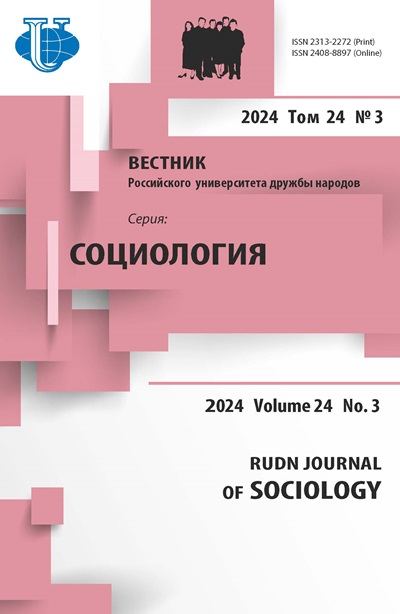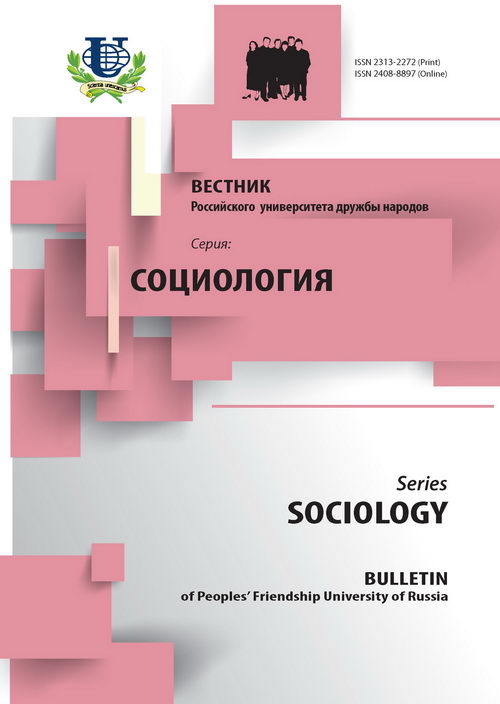From Information Society to Knowledge Societies
- Authors: Bunina VG1
-
Affiliations:
- Moscow State Institute of International Relations (University)
- Issue: No 2 (2010)
- Pages: 16-26
- Section: Articles
- URL: https://journals.rudn.ru/sociology/article/view/6440
Cite item
Full Text
Abstract
International organizations and especially UNESCO are taking an increasingly active part in the analysis of the contemporary society making it aim to elaborate ideology as well as practical advice for social institutions' development. The subject matter of the study in the publication is the World Report «Towards Knowledge Societies» where a comprehensive analysis of social and humanitarian development of mankind at the turn of millennium is provided and the concept of «sustainable development» of the world community in the XXI century is elaborated. The concept is based on the idea of indispensability of transition from the «information society» fraught with a negative and dangerous tendency to social disintegration both at national and international levels to «knowledge societies» focusing on moral and ethical values as well as cognitive competencies.
About the authors
V G Bunina
Moscow State Institute of International Relations (University)
Author for correspondence.
Email: verabunina@yu.ru
Кафедра французского языка № 1; Московский государственный институтмеждународных отношений (Университет); Moscow State Institute of International Relations (University)
References
- Vsemirnyi doklad YuNESKO «K obshchestvam znanii», Unesco's World Report «Towards Knowledge Societies». - Parizh: UNESCO, 2005, http://unesdoc.unesco.org/images/0014/ 001418/141843e.pdf, russkii perevod // http://unesdoc.unesco.org/images/0014/001418/ 141843r.pdf.
- Globalizatsiya i Rossiya (Kruglyi stol) // Mirovaya ekonomika i mezhdunarodnye otnosheniya. - 2002. - № 9. - S. 3-25.
- Delor Zh. i dr. Obrazovanie: sokrytoe sokrovishche. - Parizh: UNESCO, 1996 // <http://unesdoc.unesco.org/images/0010/001095/109590rb.pdf>.
- Draker P. Postkapitalisticheskoe obshchestvo // Novaya postindustrial'naya volna na Zapade: Antologiya / Pod red. V.L. Inozemtseva. - M.: Academia, 1999.
- Doklad o razvitii chelovecheskogo potentsiala PROON // http://hdr.undp.org/en/media/ HDR_2009_EN_Complete.pdf <http://hdr.undp.org/en/media/HDR_2009_EN_Complete.pdf>.
- Doklad Vsemirnoi komissii OON po okruzhayushchei srede i razvitiyu (doklad G.Kh. Bruntlanda). Report of the World Summit on Environment and Development. United Nations. - N.-Y.: UN, 1987 // http://www.un-documents.net/wced-ocf.htm.
- Kastell's M. Informatsionnaya epokha: ekonomika, obshchestvo i kul'tura / Per. s angl. pod nauchn. red. O.I. Shkaratana. - M.: GU-VShE, 2000.
- Kastell's M. Stanovlenie obshchestva setevykh struktur // Novaya postindustrial'naya volna na Zapade: Antologiya / Pod red. V.L. Inozemtseva. - M: Academia, 1999.
- Kastell's M. Mogushchestvo samobytnosti // Novaya postindustrial'naya volna na Zapade: Antologiya / Pod red. V.L. Inozemtseva. - M.: Academia, 1999.
- Maklyuen M. Galaktika Gutenberga. - M.: Akademicheskii proekt, 2005.
- Pruss I. Mozgi utekayut navsegda // Vzglyad. - 20.12.2006 // http://www.vz.ru/society/ 2006/12/20/61732.html.
- For E. i dr. «Uchit'sya sushchestvovat': mir obrazovaniya segodnya i zavtra». - Parizh: UNESCO, 1972 // http://www.unesco.org/education/pdf/15_60_f.pdf.
- Dahl Robert A. Democracy and It's Critics. - New Haven: Yale University Press, 1991.
- Hutchins, Robert Maynard. The Learning Society. - New York: F.A. Praeger, 1968.
- Husén, Torsten. The Learning Society. - London: Methuen, 1974.
- Talmon J.L. The Origins of Totalitarian Democracy. - N.Y.: Praeger, 1960.














